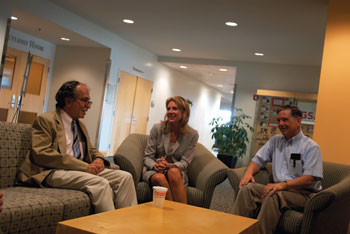It’s no surprise that an Honors University in Maryland has a chapter of America’s longest-lived and most prestigious academic honor society. But hosting a chapter of Phi Beta Kappa (PBK), founded in 1776 at The College of William and Mary, requires an intensive application and review process by the organization. Success is a sign of great distinction and intellectual rigor – especially at a university as young as UMBC. Jay Freyman, associate professor of ancient studies and first president of UMBC’s chapter, Anna Shields, current president and director of UMBC’s Honors College and outgoing Phi Beta Kappa chapter president and professor of computer engineering John Pinkston sat down with UMBC Magazine to talk about UMBC’S chapter which was created in 1997.
Q: I have read that it took a decade to create UMBC’s chapter of Phi Beta Kappa.
Jay Freyman: Oh, longer. We put in a preliminary application in 1979. The campus was only 13 years old. The term for that is “chutzpah.” We put in another application in 1982. That didn’t go anywhere either. But it was important that we did it. Because the executive secretary of Phi Beta Kappa invited us down to his office… and told us, “This is what we have concerns about.” One of the things that he suggested was that we start an Honors Program, which is now the Honors College.
After another 12 years, we thought we had a chance, so we applied in 1994 and were eventually approved in 1997.
Q: Students can’t apply to Phi Beta Kappa. They are chosen based on academic excellence and fulfillment of certain criteria – including 90 credits in liberal studies subjects, at least one college-level course in mathematics, and 18 credits in a structured program outside their major. How do you let students know what they need to do to be eligible?
Anna Shields: As director of the Honors College, one of the things I have my advising teams do is to let students know that Phi Beta Kappa is something that should be on their radar. That they need a college-level math course, for instance.
John Pinkston: The eligibility requirements are spelled out on our web page, but we need to do a better job of informing people about how meaningful membership is, and differentiate Phi Beta Kappa from other honor societies that have come on the scene.
Jay Freyman: There are two hard pieces of evidence that Phi Beta Kappa is different. First, the age. It was formed in 1776. There really isn’t anything else that comes up to that on its prestige. Second, there is the difficulty in obtaining a chapter charter.
Q: What’s the greatest misconception about Phi Beta Kappa at UMBC?
John Pinkston: The question of liberal studies can be interpreted many ways. At Princeton, where I graduated, engineers were eligible for Phi Beta Kappa. And I think there is an argument to be made that knowledge of technology is an important part of a liberal education. I was very pleasantly surprised at how receptive the UMBC chapter was to that idea.
Anna Shields: I think there’s a misconception in the culture generally that the love of learning is something that’s affiliated only with humanistic modes of inquiry. That’s not the case. You can’t turn over a rock here at UMBC without finding a passionate chemist or physicist or computer scientist. Passion and love of learning and liberal education can all go together and be perfectly coherent and important at a school that has strong STEM [science, technology, engineering and mathematics] disciplines. Part of our job as the chapter is to explain to students how their membership reaffirms things about them that they may not have conceptualized or articulated as love of learning and passion for education.
— Richard Byrne ’86
Tags: Fall 2010

